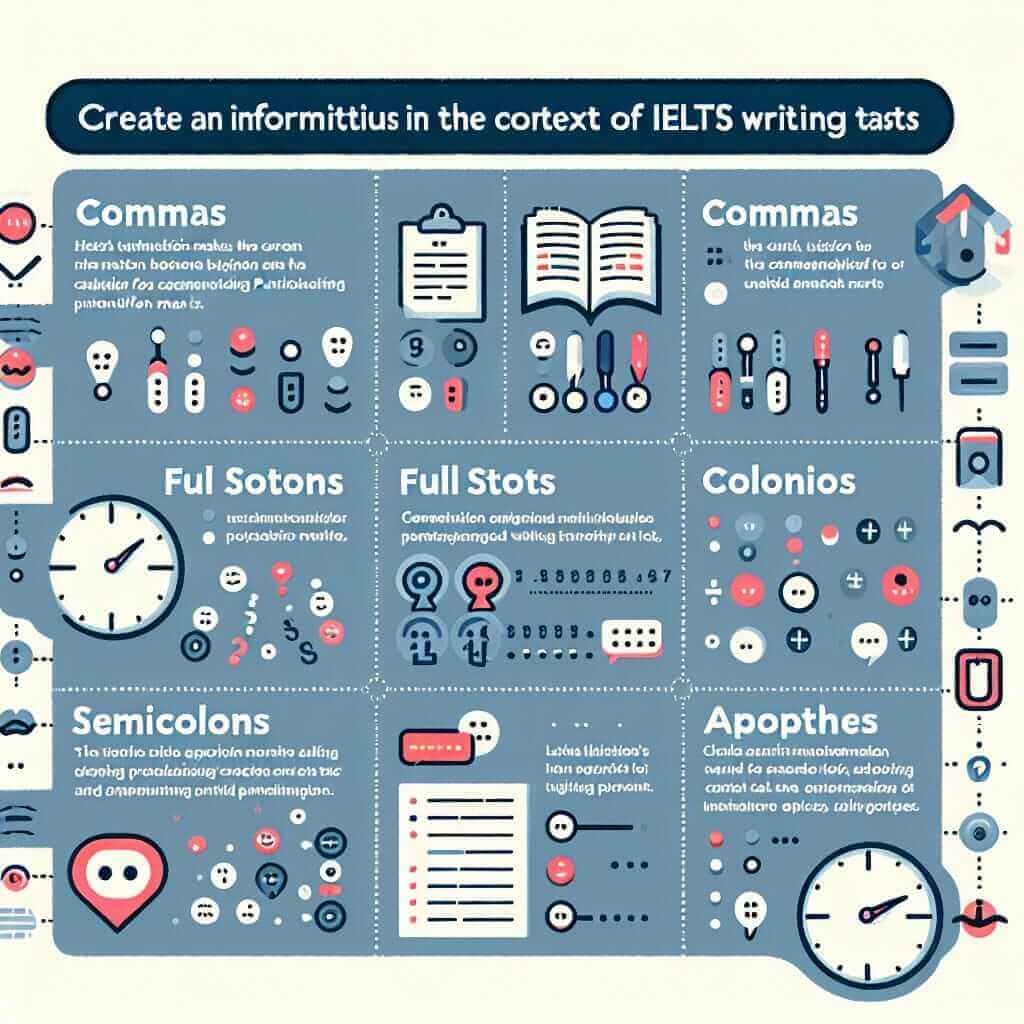As an IELTS instructor with over 20 years of experience, I’ve seen firsthand how correct punctuation can significantly impact your writing score. It’s not just about avoiding errors; it’s about conveying your ideas clearly, logically, and effectively. In the IELTS writing exam, where clear communication is paramount, mastering punctuation is a non-negotiable skill.
Nội dung bài viết
This guide will equip you with the knowledge and strategies to use punctuation effectively in your IELTS writing, boosting your overall score.
Why is Punctuation Important in IELTS Writing?
Many IELTS test-takers underestimate the importance of punctuation. They focus heavily on vocabulary and grammar, neglecting this crucial aspect. However, the IELTS marking criteria clearly state that punctuation is assessed under “Grammatical Range and Accuracy.”
Here’s why punctuation matters:
- Clarity: Correct punctuation ensures your sentences are clear and easy to understand. It eliminates ambiguity and helps the examiner follow your train of thought.
- Coherence: Punctuation marks act as signposts, guiding the reader through your text. They show how different parts of your sentences are connected, making your writing flow smoothly.
- Sophistication: Using a range of punctuation marks appropriately demonstrates a good command of written English, which can positively impact your score.
Essential Punctuation Marks for IELTS Writing
Let’s delve into the specific punctuation marks you need to master for IELTS writing:
1. Comma (,)
The comma is perhaps the most versatile and frequently misused punctuation mark. Here’s how to use it correctly:
- Separating items in a list: I enjoy reading, writing, and listening to music.
- After introductory phrases or clauses: After finishing my homework, I went for a walk.
- Before coordinating conjunctions (and, but, or, so, yet, for): The film was long, but I enjoyed it.
- Enclosing non-essential information: My neighbor, who is a chef, makes delicious pasta.
Common Comma Errors to Avoid:
- Comma splice: Joining two independent clauses with only a comma.
- Incorrect: The sky was blue, the birds were singing.
- Correct: The sky was blue, and the birds were singing.
- Using commas where they aren’t needed:
- Incorrect: I went to the, store to buy milk.
- Correct: I went to the store to buy milk.
2. Full Stop (.)
The full stop marks the end of a sentence. It indicates a complete thought.
Common Mistakes:
- Run-on sentences: Combining multiple sentences without proper punctuation.
- Incorrect: I went to the market I bought some fruit then I came home.
- Correct: I went to the market. I bought some fruit. Then, I came home.
- Sentence fragments: Using a full stop where a comma or semicolon is needed.
- Incorrect: Although it was raining. I decided to go for a walk.
- Correct: Although it was raining, I decided to go for a walk.
3. Semicolon (;)
The semicolon connects two closely related independent clauses. It creates a pause that is stronger than a comma but weaker than a full stop.
- Joining related sentences: The library was crowded; I decided to study at home.
- Separating items in a complex list: I visited Paris, France; Rome, Italy; and Athens, Greece.
Common Mistakes:
- Using a semicolon where a comma is needed.
- Incorrect: I enjoy reading books; especially novels.
- Correct: I enjoy reading books, especially novels.
4. Colon (:)
The colon introduces something that follows, such as a list, explanation, or quotation.
- Introducing a list: I need to buy the following: milk, eggs, and bread.
- Providing an explanation: The reason for the delay is clear: heavy traffic.
Common Mistakes:
- Using a colon after a verb or preposition.
- Incorrect: I enjoy activities like: reading, swimming, and hiking.
- Correct: I enjoy activities like reading, swimming, and hiking.

5. Apostrophe (‘)
The apostrophe indicates possession or contraction.
- Possession: The cat’s toy, the children’s books
- Contractions: don’t, can’t, it’s (it is)
Common Mistakes:
- Confusing “its” and “it’s”: “It’s” is a contraction of “it is,” while “its” is possessive.
- Using apostrophes for plurals: The books (not book’s) are on the shelf.
IELTS Writing Tips: Punctuation in Action
Let’s see how these punctuation marks work in the context of IELTS writing tasks:
Task 1 (Graph Description):
- “The graph illustrates the population growth in Tokyo, Japan, from 1950 to 2000.” (Comma after place names in a list)
- “While the population increased steadily between 1950 and 1980; there was a more dramatic rise in the following two decades.” (Semicolon connecting related sentences)
Task 2 (Essay):
- “Some people believe that technology has made our lives easier; others argue that it has led to social isolation.” (Semicolon showing contrast)
- “One of the main advantages of using public transportation is that it reduces traffic congestion.” (Comma after introductory phrase)
Practice Makes Perfect
To improve your punctuation:
- Review the rules regularly: Keep a punctuation guide handy and refer to it often.
- Practice with IELTS writing samples: Analyze how punctuation is used in high-scoring essays and reports.
- Proofread carefully: Always dedicate time to review your work for punctuation errors.
Conclusion
Mastering punctuation is not an overnight task, but it’s an investment that will pay off significantly in your IELTS writing score. By understanding the rules and practicing regularly, you can ensure that your writing is clear, coherent, and – most importantly – impressive to the examiner. Good luck!